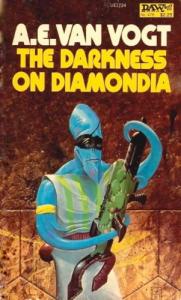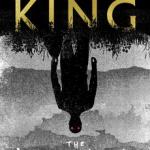A.E. van Vogt was ahead of his time. So far ahead of his time, in fact, that I think he hasn’t been as appreciated as much as he deserves. Take for example his 1972 book The Darkness on Diamondia. I can certainly understand that this book was not well received in its day, and consequently has been overlooked by later generations. This is unfortunate, because it is dealing with issues that are directly relevant now.
That said, I can understand why science fiction aficionados would pass over this one. The technology aspect of this book is muted at best. [Spoilers abound from here on out.] At first glance, The Darkness on Diamondia is just another space opera more reminiscent of the 1950s golden-era of sci-fi rather than the more surreal 1970s works. It appears that the basic plot has to do with the perils of colonization. The human “Diamondians” are a minority on the planet Diamondia, and have come under attack by the native Irsk. Only the Earth Federation military stands between the Diamondians and extermination by the Irsk (despite a healthy contingent of Irsk who are “friends of the Diamondians”). Colonel Charles Morton has been sent as a part of the Federation Negotiating Committee nominally to find a peaceful resolution so that both sides can live in harmony, but in reality simply to extricate the Earth Federation forces regardless of the cost to the Diamondians. This is made emotionally difficult by the fact that the Diamondians live in the traditional Earth fashion (and are perhaps the only people left in the galaxy who do). In an age of spaceships and intergalactic travel, the Diamondians zip around cities like “New Naples” in cars and live in traditional houses. Familiar Earth landmarks dot the city (Neapolitan ones, anyway) and create a sense of being at home. In this setting, Morton has to navigate the political alliances and factions in an effort to accomplish his mission as quickly and peacefully as possible.

That is the nominal plot, but if you go into this book thinking that you’re going to get a straightforward sci-fi political thriller, well, it’s no wonder many people got turned off. Because pretty quickly it becomes clear that there is a second layer to this book. It’s not just about inter-species war and politics, it’s also about logic. Specifically, it’s about what Morton calls “Modern” logic as contrasted with “finite” logic. I’ll admit that I don’t remember which is which, but from what I can tell this book involves an attempt by van Vogt to contrast “set theory” with what today we would call “chaos theory.” (I mean, it might have been called that in the 1970s too, I’m neither a mathematician nor a historian of mathematical theory, so take that point and all of the rest of this for what they are worth.) The idea here is that the old, 20th century style of logic treated everything in ‘sets’. Computers operated on the principle that a switch was either on or off, and that all parts in the same set could be interchangeable. So a transistor in one computer (computers use transistors, right?) can be switched out with another transistor if it breaks. Mathematicians and engineers deep down all knew that there was something wrong with the theory, but as long as it kind of worked nobody cared. At some point in the early 21st century, set theory collapsed when functionally all complex machines stopped working. This was a failure of set theory, but was historically personalized as all individuals in the set standing up and saying “I’m an individual, and must be treated as such.” This led to the new form of logic which led to multiple technological breakthroughs.
We never get details about the new form of logic. Every time Morton starts to reflect on how different things are after this intellectual revolution, he is interrupted and we are left without an explanation of it. In part, this is because “logic” is only the second layer of the book. The third layer has to do with identity. Morton and all of the other humans on Diamondia occasionally struggle from moments of… darkness, for lack of a better word. That is, every so often the world goes a bit dim and Morton has to stop and concentrate to regain his focus. The more he learns about the planet, the more he realizes that this is not a natural occurrence. In fact, the native Irsk are not individual beings the same way that the human Diamondians are. While they do have individual bodies (their sole individual features are their names), they are all connected through an overarching “government” that binds them together in a great unity, and which is planning to conquer the known galaxy by bringing all beings into this binding unity. The “darkness” is the effect this entity has on human beings–and it’s getting stronger.
By freak accident, Morton finds himself at the helm of the darkness, but lacking the knowledge of how to direct it. He can join or even become any person on Diamondia, but he can’t figure out how to stop the Darkness from eliminating all human life on the planet and expanding its conquest across the galaxy. Even as more and more people “become” Morton, the future looks increasingly grim for mankind. If Morton gives up control of the Darkness, the Irsk will eliminate the Diamondians. If he doesn’t, he will cease being an individual and become just one of a set of “Mortons” as his identity is imprinted on more and more people under the influence of the Darkness.
I’ve talked about each of these levels as if they are separate plot devices running side-by-side, but as with any good work of fiction, they all flow in and out through each other seamlessly. Each by itself would make an interesting book, but all together make a fascinating read–especially in our contemporary world of identity politics. Just what does it mean to be an individual and a human at the same time? Are we all interchangeable as members of the “human being” set, and therefore all basically the same? Or are we all unique individuals with our own identities who don’t fit (perfectly or otherwise) in any specific set? Christianity historically teaches both, though obviously with nuances and conditions. We are all made in God’s image, part of Adam’s race, fallen, and in need of salvation through Christ. But we are also all individuals with our own characters, identities, and responsibilities. Clearly this is a complicated issue, and as such books like The Darkness on Diamondia are helpful in thinking it through.
Don’t get me wrong. This isn’t a fast read. I read this book in 2-and-3 page chunks over the course of a couple of weeks. I don’t know that I could have absorbed it any faster than that. So do pick it up and read it, but do also take your time and chew slowly as you work through this complex novel.
Dr. Coyle Neal is co-host of the City of Man Podcast and an Assistant Professor of Political Science at Southwest Baptist University in Bolivar, MO. He controls neither the Darkness nor the identity of those around him.













